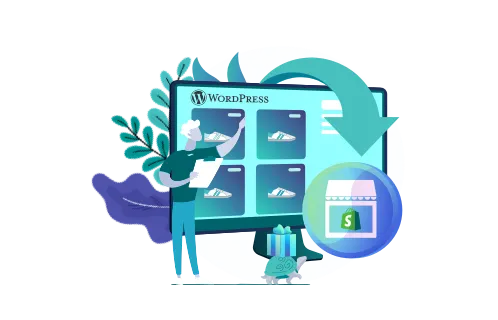BigCommerce vs Shopify — which platform suits your online business best?
While both offer extensive functionality and various pricing plans, you can get confused when choosing the right one for your eCommerce store.
Hopefully, today’s guide will dispel your doubts regarding the perfect match to power your business, draw new customers, and boost sales.
GenovaWebArt has prepared a comprehensive comparison of BigCommerce and Shopify, elaborating on core platforms’ features, pricing, pros/cons of bigcommerce and shopify, and some market insights.
Our company is an experienced Shopify development services provider with over 200 successfully delivered online stores.
See the example of Shopify Plus development services by GenovaWebArt for a Ten Thousand online store. We know all the subtleties of eCommerce platforms and will share our expertise in this article.
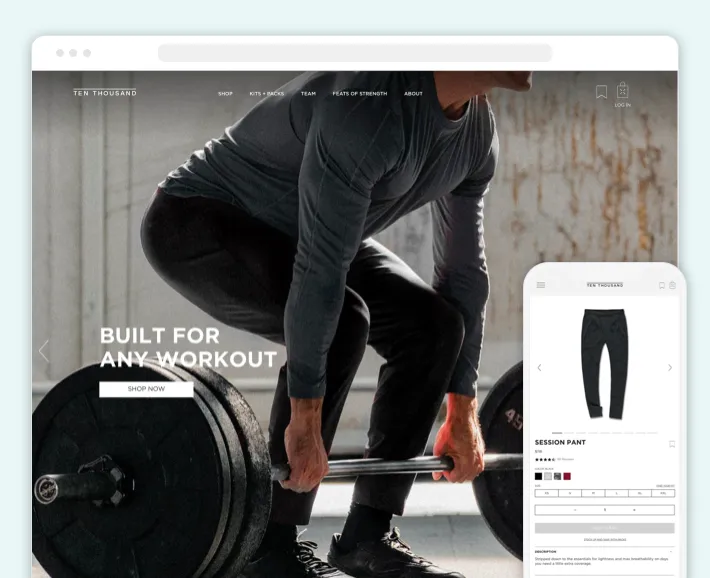
Shopify vs BigCommerce: A Quick Comparison
Let’s start our Shopify vs BigCommerce comparison with a brief review of the core platform characteristics. We suggest discussing pricing, sales, marketing, customer support, security, and other features. Also, read our Shopify vs. WooCommerce guide if you haven’t done it yet.
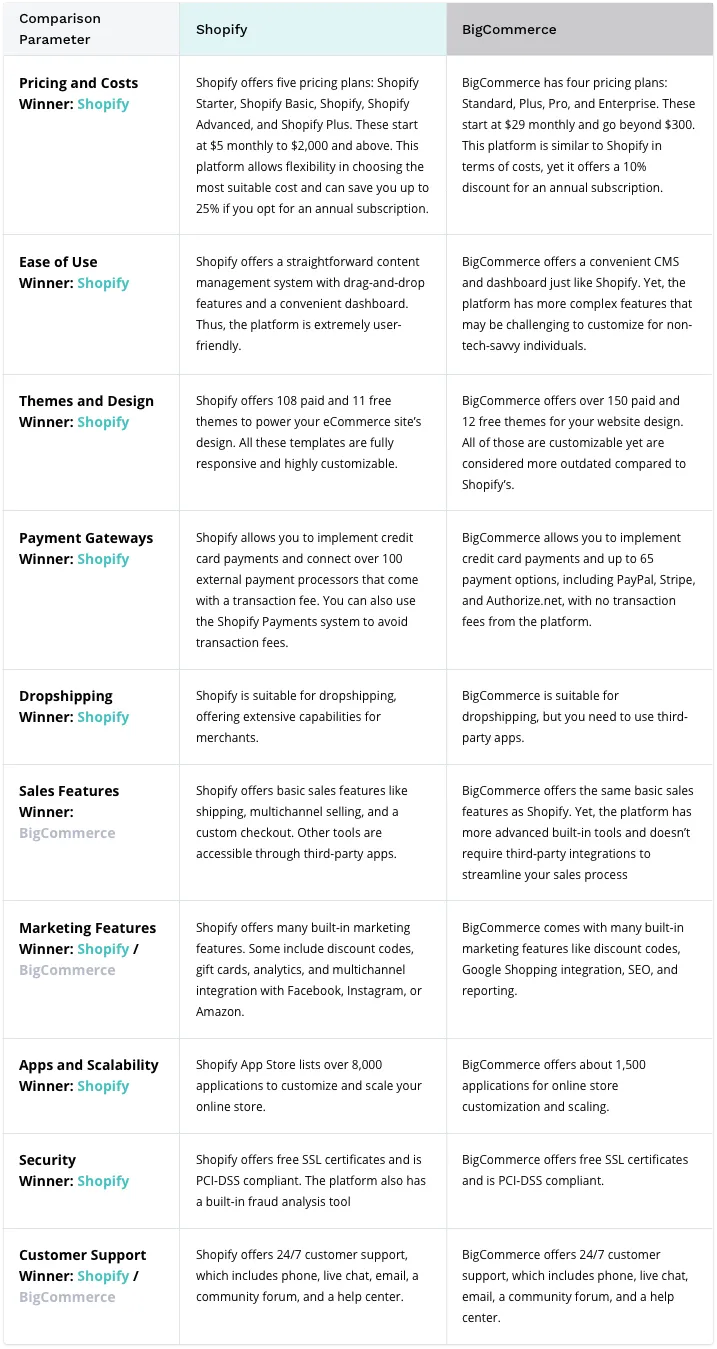
As clear as it gets, Shopify is today’s winner. While Shopify and BigCommerce go hand-in-hand in features and similar pricing plans, the first slightly outperforms the other.
Yet, choosing the perfect eCommerce platform for your online store significantly depends on your business needs. Read on to discover the difference between BigCommerce and Shopify in greater detail.
Shopify vs BigCommerce: Market Share and Statistics
It’s also vital to consider some stats on the eCommerce platforms we’re discussing today. Let’s compare BigCommerce and Shopify market share and other factors that show the popularity of these solutions.
According to BuiltWith, Shopify is one of the most popular eCommerce systems, with a market share of 22% across all websites using eCommerce technology. BigCommerce significantly falls behind, with only 7.41% of online stores operating on this platform.
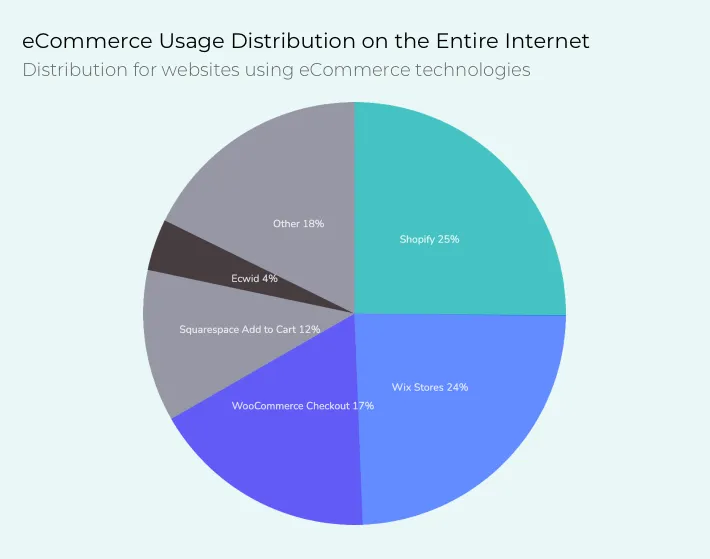
Speaking of the US stats for eCommerce platforms, Shopify market share is 25%, while BigCommerce accounts for 0.3% of eCommerce websites in the United States.
Let’s put the above information in more precise numbers. Here’s how many eCommerce websites use Shopify and BigCommerce, following BuiltWith:
- Over 4.5 million online stores are using Shopify
- About 51 thousand online stores are using BigCommerce
Adding to that, BigCommerce has lost about 9,000 customers to Shopify while gaining about 2,000. It is clear that Shopify is more common, but let’s look at what Google Trends suggests:
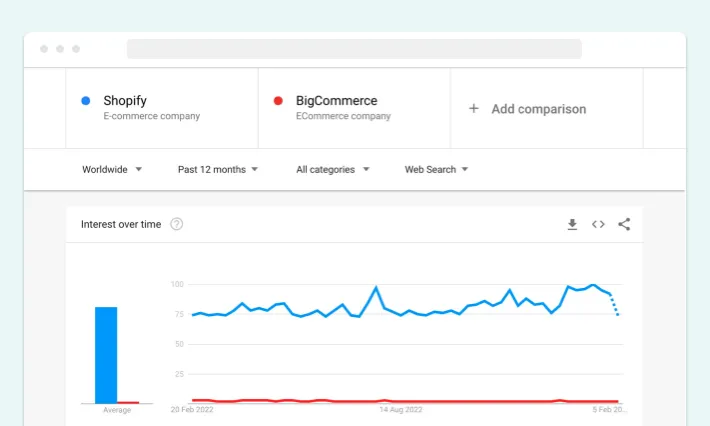
As you can see, way more users search for Shopify, which makes this platform far more popular than BigCommerce. Yet, both platforms have pros and cons, so keep reading to learn more about them.
BigCommerce vs Shopify: Pros and Cons
Let’s compare Shopify and BigCommerce in terms of the platforms’ main pros and cons. Here’s what you can expect:
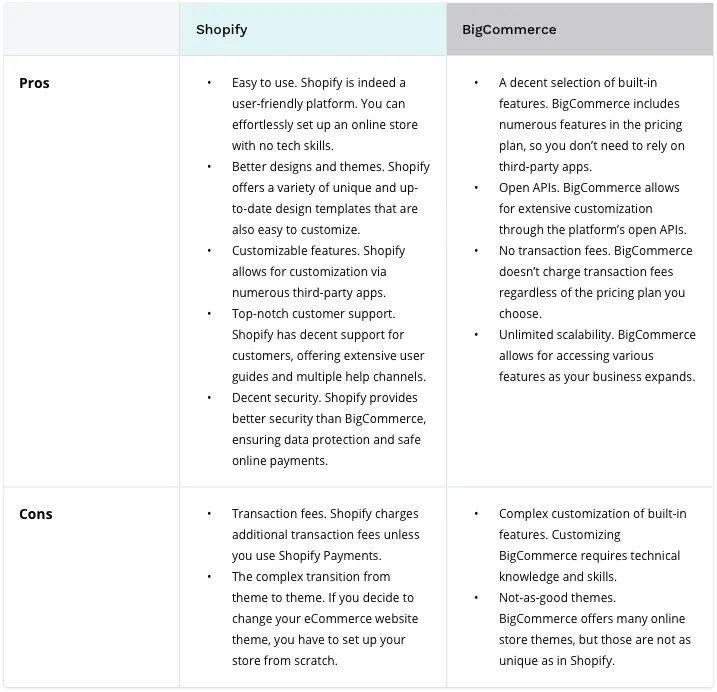
With all that said, which is better: Shopify or BigCommerce? Both platforms have their benefits and drawbacks, and it’s up to you to decide what corresponds to your business needs.
You may also be interested in How to Set Up Shopify Markets for Global Selling?
Shopify or BigCommerce: A Detailed Comparison
Now we’re moving on to our comprehensive comparison of BigCommerce versus Shopify. We’ll go through the characteristics mentioned at the beginning of this article in greater depth.
1. Pricing and Costs
Probably, pricing is the first matter of your interest. How much will it cost you to launch an online store? Let’s see the Shopify vs BigCommerce pricing plans.
Shopify comes with a free three-day free trial and five pricing options, which are as follows:
- Shopify Starter — $5 monthly for selling products through social media and messaging apps
- Shopify Basic — $32 monthly for setting up an online store with two staff accounts, basic reports, and up to 1,000 inventory locations
- Shopify — $92 monthly for launching an online store with five staff accounts, professional reports, and up to 1,000 inventory locations
- Shopify Advanced — $399 monthly for an online store with custom reporting, 15 staff accounts, and up to 1,000 inventory locations
- Shopify Plus — starting at $2,000 monthly for enterprise-level online stores, combining all functionality of other pricing plans and offering increased customization
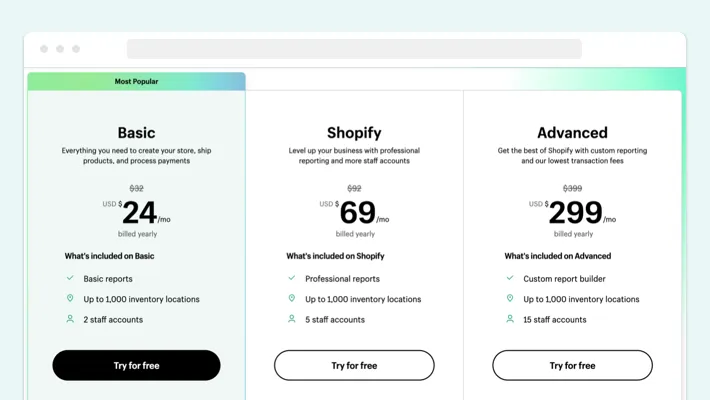
You also get an up to 25% discount if you pay for an annual subscription. It can help you save significantly.
As for BigCommerce, it goes with a 15-day free trial and four pricing plans:
- Standard — $29.95 monthly for a basic online store builder
- Plus — $79.95 monthly for an online store builder with robust marketing tools
- Pro — $299.95 monthly for scaling your online store with extensive features
- Enterprise — custom pricing for enterprise-level online stores
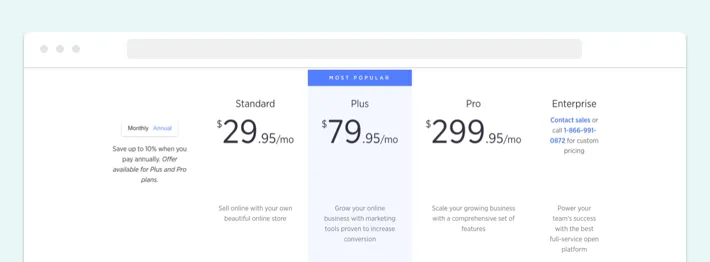
BigCommerce also offers a 10% discount if you buy an annual subscription.
Comparing both platforms, Shopify offers better flexibility in terms of pricing so you can choose the most suitable option for your business. Yet, BigCommerce doesn’t fall behind much.
2. Ease of Use
Both Shopify and BigCommerce are user-friendly. Still, Shopify proves to be slightly more convenient. And here’s why.
Shopify offers a straightforward admin panel where you can navigate and modify your store effortlessly. Plus, no code involved. You just need to use simple drag-and-drop features to edit your products, theme, and more.
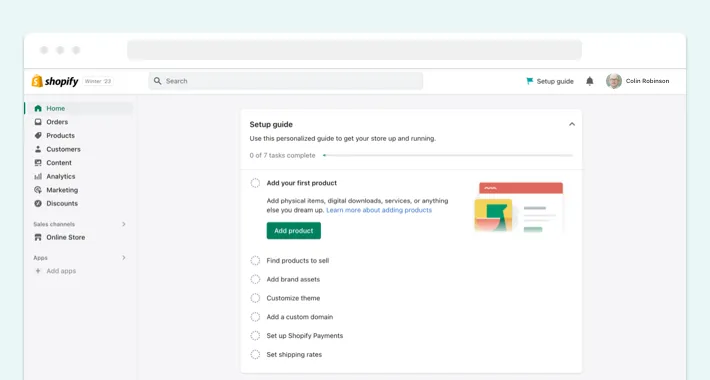
While an interface with drag-and-drop functions is also true for BigCommerce, it’s more complex to navigate. This platform comes with numerous out-of-the-box features, and a business owner can get overwhelmed when setting up their eCommerce website.
3. Themes and Design
Themes are responsible for your eCommerce website’s overall look and feel, and you most likely want it to be attractive to draw more customers. It's hard to judge the difference between Shopify and BigCommerce aesthetically, but Shopify themes are considered more modern and unique.
What we can objectively state is that Shopify offers highly customizable themes. You can select between 119 paid and free design templates to find the one that suits your business best, filtering them by industry, catalog size, and necessary features. The paid themes will cost you from $180 to $350.

BigCommerce Theme Store offers more themes than Shopify Theme Store, namely, over 150 paid and 12 free templates. Yet, the numbers don’t matter much, as most of those themes are variations of the same theme with a slightly changed color palette. Speaking of pricing, expect to pay from $150 to $399 for a design template.
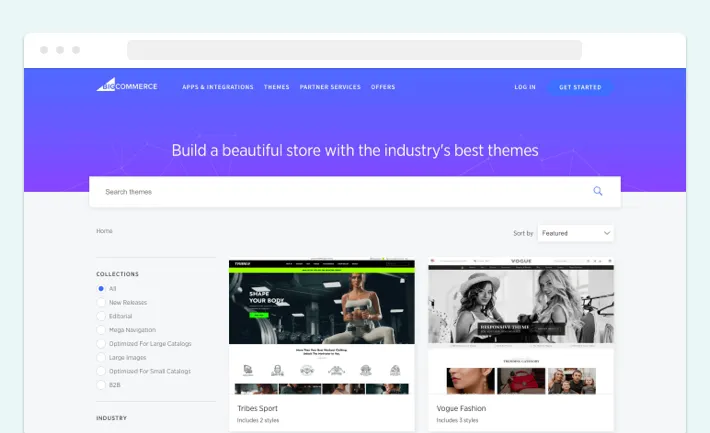
4. Payment Gateways
Your eCommerce website should enable payment processing, so your customer can shop in your store conveniently.
Shopify and BigCommerce support third-party gateway integrations, including the most popular ones like PayPal, Stripe, and Square. Shopify has an edge in this regard, enabling online store owners to connect over 100 payment gateways, while BigCommerce allows for cooperation with about 65 payment processors.
5. Dropshipping
A dropshipping business depends on the ability to quickly find products from suppliers and easily organize the shipping process. Let’s compare our BigCommerce vs Shopify reviews regarding dropshipping opportunities.
Shopify has the upper hand as the platform partners with Oberlo. It’s a go-to supplier of a large number of products, allowing businesses to hop on a dropshipping model easily.
BigCommerce also makes it possible to organize dropshipping processes. For this, you need to install one of the available third-party product-sourcing apps, most of which fail to compete with Oberlo.
6. Sales Features
BigCommerce and Shopify have some common basic sales features. These include multichannel selling that connects channels like eBay, Amazon, Walmart, Facebook, Google, etc., and shipping tools like setting shipping locations and printing shipping labels.
Other than that, you can access inventory management capabilities on both platforms. In this case, BigCommerce is the one that allows you to sell physical and digital products and services without additional third-party apps, while Shopify requires installing some extensions.
BigCommerce comes with other handy built-in sales features. These include reviews and ratings, real-time shipping quotes from carriers, and unlimited staff accounts. All this makes this platform better for your sales.
7. Marketing Features
Marketing features are critical for promoting your products and business. Is Shopify better than BigCommerce in terms of marketing? We’d say that it is.
The Shopify platform offers an extensive set of built-in tools and various apps you can integrate to promote your online store. For instance, you can use email marketing with pre-made templates to build strong customer relationships. Or you can get more loyal clients by introducing gift cards and discounts. On top of that, you can access analytics tools and leverage basic SEO capabilities.
BigCommerce offers similar marketing capabilities to Shopify. They include email marketing, discount codes, and professional reports. While Shopify slightly outperforms BigCommerce in marketing tools, the second platform has better SEO features, allowing you to customize the URLs fully and increase conversion rate.
8. Apps and Scalability
Both BigCommerce and Shopify have dedicated marketplaces with third-party apps. You can scale your Shopify store and extend its functionality by installing some.
Shopify is a clear winner regarding apps, as its store offers over 8,000 applications for different purposes. You can choose an extension by the following categories: finding products, selling products, orders and shipping, marketing and conversion, and store design.
BigCommerce app store allows you to search for applications by more specific categories like CMS, checkout, accounting, sales channels, etc. Yet, it offers fewer apps than Shopify as it replaces some of those extensions with built-in features.
9. Security
If you compare the security of BigCommerce and Shopify, both offer almost identical security measures. Both platforms are PCI DSS-compliant, which means they protect credit card data. They also support SSL certificates and deliver other security means like server-specific firewalls, HTTPS protocol, intrusion detection, DDOS protection solutions, etc. Still, Shopify offers fraud detection tools, which makes this platform more secure.
10. Customer Support
Is BigCommerce better than Shopify when it comes to customer support? Probably not. Both platforms are at about the same level. They provide the following services:
- 24/7 phone support
- 24/7 live chat
- Email support
- Support forum
- Help center
- Video tutorials
So if you get questions regarding shopping carts and shipping store setup or money transfer processing, you may swiftly contact customer support through various channels.
Speaking of BigCommerce, they facilitate your onboarding process by scheduling a call with you. Shopify, in turn, offers a better-structured help center where you can find the answers to probably all the questions that may appear during your online store development.
Read also: How to Migrate from BigCommerce to Shopify: 5 Essential Steps
GenovaWebArt Is Ready to Become Your Reliable Shopify Partner
GenovaWebArt is a certified Shopify design and development services provider. We’ve been delivering successful online stores since 2012 and can do the same for you if you choose Shopify over BigCommerce.
We can back you up with a team of skilled professionals, including:
- Designers
- Frontend developers
- Backend developers
- Analysts
- QA specialists
- Project managers
Our specialists may help you with the following processes:
- Shopify theme development and customization
- Shopify app development
- Shopify design
- Shopify migration process, e.g., through Cart2Cart
- Shopify solutions development from scratch
What will you get if you hire us?
GenovaWebArt offers reasonable pricing, strict adherence to deadlines, and top-notch communication. You’ll also build a decent online store on Shopify that’ll attract numerous clients and increase your sales.
If you still don't understand what is the difference between BigCommerce and Shopify and are hesitant, check out some of the projects we've implemented on the Shopify platform. We’ll prove that Shopify is a perfect match for your business.
Kit and Kin
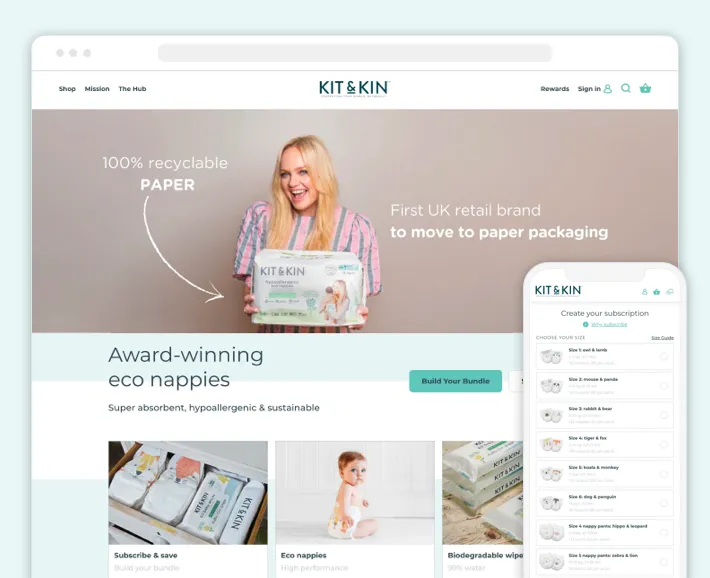
Kit & Kin is a UK-based online store that sells nappies and childcare products. The GenovaWebArt team handled the migration process to Shopify Plus. Currently, we provide ongoing support services to this eCommerce business.
Ten Thousand

Ten Thousand is a sportswear brand from the US. Our primary task was to build an online store from scratch. As a result, the GenovaWebArt team has provided Shopify Plus development services. We also keep maintaining this eCommerce website till now.
Bird and Blend Tea Co.
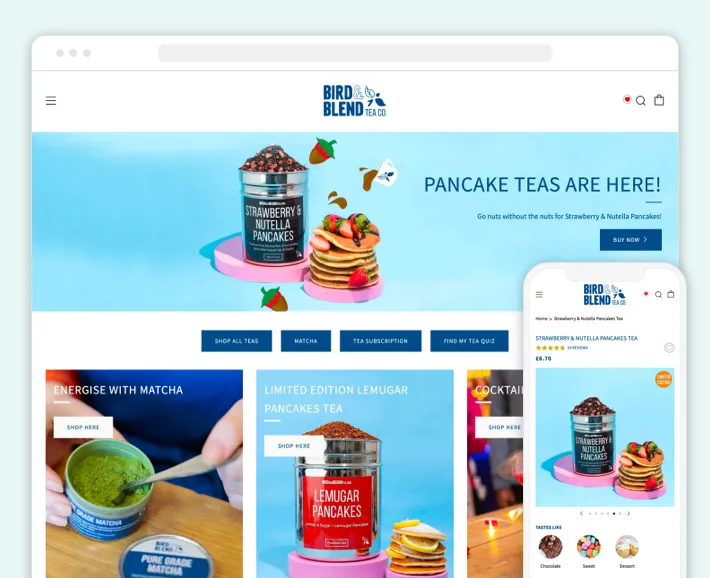
Bird & Blend Tea Co. is a company that sells various mixes of teas. We had to create a convenient eCommerce website on Shopify. GenovaWebArt provided Shopify development services and ongoing tech support to this online store.
There are way more projects waiting for your evaluation in our portfolio.
Conclusion
At this point, you must know the difference between Shopify and BigCommerce. It’s up to you to decide which eCommerce platform is best for your business, weighing all pros, cons, pricing plans, and necessary features.
If you eventually choose Shopify to power your online business, GenovaWebArt will assist you in this process. Our experienced team can provide plenty of top-notch Shopify-related services to deliver the best eCommerce store for you. So don’t hesitate to book a consultation with our skilled experts.
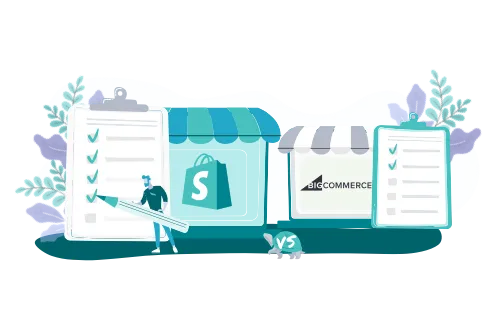


![8 Success Stories of Migrating to Shopify [Real Cases] - GenovaWebArt blog article, banner image 8 Success Stories of Migrating to Shopify [Real Cases] - GenovaWebArt blog article, banner image](https://genovawebart.com/hubfs/img/webp/hero-banner-blog-article-success-stories-of-migrating-to-shopify.webp)

